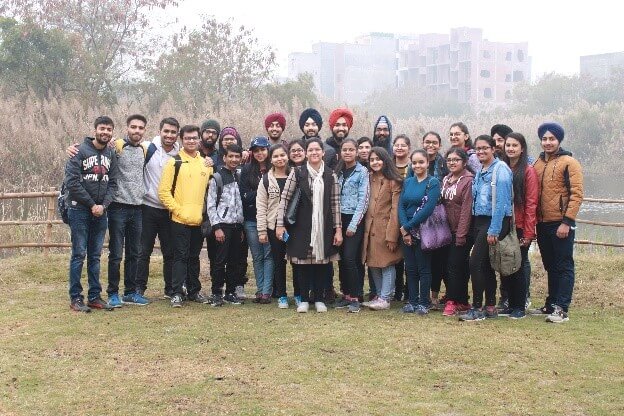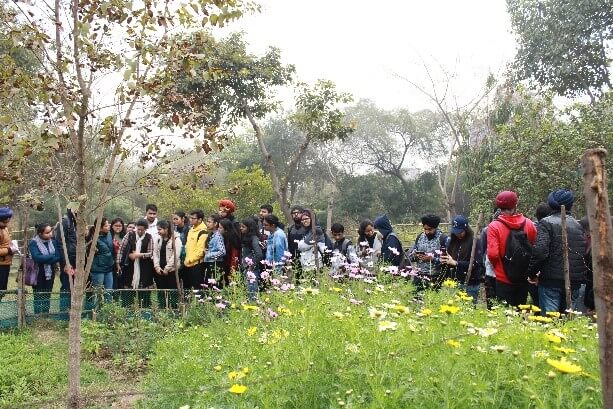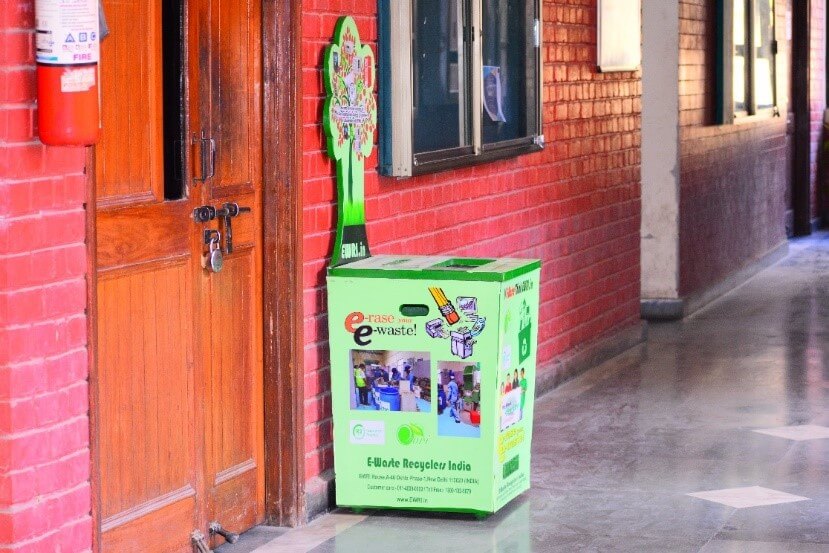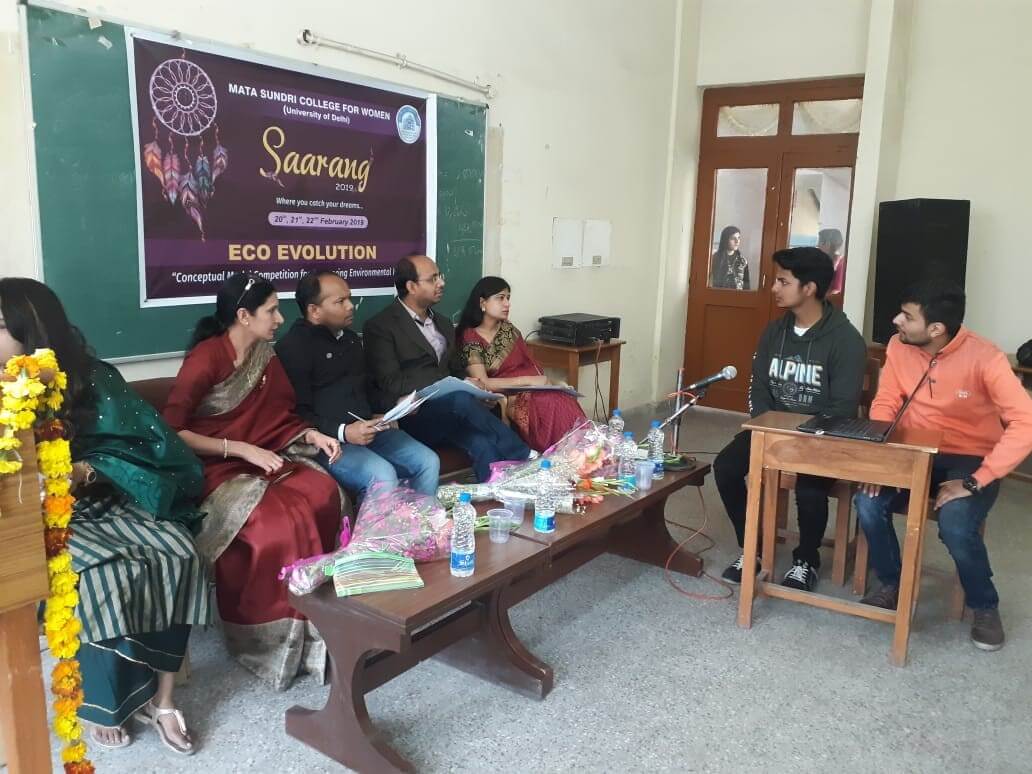Sri Guru Gobind Singh College of Commerce envisions to bring the society towards sustainability by seeding embodied environmental sensibility and through collaborative learning. We enable the learners to advance their discipline-specific knowledge, capabilities, skills, and develop the demeanour of lifelong learning. Realizing current sustainability challenges, the institution motivates the learners to seek novel ways of understanding, acting in and caring for the ecosystem we live in. Conceptualizing its role towards environmental conservation, the institution has taken crucial steps such as waste management, a growing canopy cover of trees and campus cleanliness. Inculcating the biosphere stewardship in the learners is at the forefront of our vision, both as a practice and as a value inculcation drive. Optimization of public resources is our guiding principle in tandem with the motivation of instilling of humane and ecological values among the learners. We, at the college, regard inculcation of Environmental Sensibility and Stewardship as one of our Best Practices. The present report summarizes the efforts put in by the college community to create a campus- wide culture of sustainability and conservation.
We strive towards imparting the environmental education and pro-environmental attitude through an Ability Enhancement Compulsory Course on Environmental Studies. The subject is taught with a great zeal to the leaners of all streams as a part of their first-year undergraduate curriculum. Besides imparting theoretical understanding of the cross-cutting environmental issues in the classroom, we at the college ensure imparting practical knowledge through activity-based learning. Projects, seminar papers and class room presentations along with field visits give an ample scope to integrate and amplify such knowledge gained in the teaching-learning process.
Realizing that we are not powerless against climate change, enthusiastic learners of the college envisioned their stewardship role towards threatened wetlands during celebration of World Wetlands Day (WWD) at Yamuna Biodiversity Park (YBP), Wazirabad on 2 February, 2019. The date marks the signing of the 'Ramsar Convention on Wetlands' at Ramsar, Iran in 1971. WWD theme this year is 'Wetlands and Climate Change'. The event witnessed a panel discussion which acquainted the learners with the experiences of scientists and local stakeholders working on various aspects of water conservation, related issues and wetlands. The learners were enabled to appreciate the importance of wetlands to urban future and ecosystem on a whole. The discussion sensitized them towards wetlands being severely affected by socio-economic pressures, resulting in the degradation of biodiversity and ecosystem services, and a concomitant negative impact on human communities. The learners were also enabled to realise the need for their contribution to the conservation of wetlands. Followed by the panel discussion, the learners visited the recreated wetland at the park and thoroughly enjoyed the nature trail under the guidance of their Environmental Studies Course Facilitator, Dr. Neha Goyal and Nature Education Officers at the park. In close interaction with the nature, they raised interesting queries which facilitated conceptual understanding through experiential learning. The students found it an enthusiastic experience to get acquainted with the flora and fauna at the park.
The educational excursion enhanced the learners' understanding of the deteriorating condition of their environment, various conservation strategies and their putative role in future in its maintenance. They appreciated the role of public participation and collaborative effort in maintaining the ecological balance of the ecosystem and combating climate change.


Learners in interaction with nature at the Yamuna Biodiversity Park, Wazirabad
Optimizing intelligible reuse and responsible recycling and, ensuring proper waste
segregation and management is central to our approach to nurture sustainability. The college
in collaboration with E-Waste Recyclers India is committed to contribute to the e-waste
segregation and management on campus. As a step towards making our campus carbon
neutral, the college encourages the use of paper, jute and cloth bags, discouraging the use of
plastic bags. Burning of dried leaves and waste paper is prohibited and they are properly
decomposed or recycled. As part of the Go Green initiative, solar lights have been installed
for lighting the pathways. Old records and end-of-life archives, subject to recyclability
potential are put to recycling. We encourage efficiency in paper use by maximum automation
in the college administrative and other departmental assignments. The information and the
minutes of meetings are also preferably circulated through e-mail. Student attendance and
feedback is also recorded through an application. The learners are encouraged to submit
presentations and/or softcopies of their assignments to reduce the use of paper. We have also
installed a rainwater harvesting unit in the college and solar-water heaters in the college
hostel to optimize the use of alternative energy resources.

E-waste collection bin installed outside the Computer lab
We appreciate gifting nature to the stewards, i.e. gifting the bird houses, potted herbs, air purifying plants, bonsai, etc. to the invited speakers and other visitors to the college during different events to reinforce the sense of environmental stewardship in the society. Saplings of various common and rare plant species are regularly planted by the Guest Speakers visiting the college as a go green gesture.
We also spread awareness and sensitize the staff working at various institutions on the subject of waste segregation at source and need for waste management systems that could be adopted within an institutional/organizational premise. The idea of Call to Action is imparted at a community level through street plays. Regular tree plantation drives are also organized to check environmental degradation and ensure clean and green surroundings. Garbage disposal drives, wherein, garbage bins are freely distributed to develop environmental consciousness in the community.
Our students actively participate in environment-related events in and around the campus. This year, Aniket Garg and Keshav Jain of B.Com. (Hons.) bagged first position in 'Eco- Evolution'- Conceptual Model Competition for Countering Environmental Issues, Saarang 2019 organized by Department of Environmental Science, Mata Sundri College for Women, University of Delhi on 21 February, 2019.

Aniket Garg and Keshav Jain elaborating on APEIRON, a self-developed concept on carbon capture and utilization
Dr. Neha Goyal, Assistant Professor, Department of Environmental Studies was invited for a lecture on 'World Sparrow Day' by National Animal Welfare Board, Ministry of Environment, Forests and Climate Change, Government of India. She disseminated the information pertinent to the current status of sparrows and their decline in urban scenarios to local residents of Raghubir Nagar and helped them realize public participation in ensuring conservation of birds, including house sparrow, State Bird of Delhi.
Inception of the Eco Club at the college is underway to enable successful implementation and streamlining the initiatives. Developing a herbal garden in the college campus is under conception. In due course, we are also planning to develop a dedicated, composting unit and develop a set-up for organic farming in the college premises. A sewage treatment plant is also in pipeline. Key air purifying plants are being maintained in vertical gardens and pockets of oxygen bombs are under development in the campus.